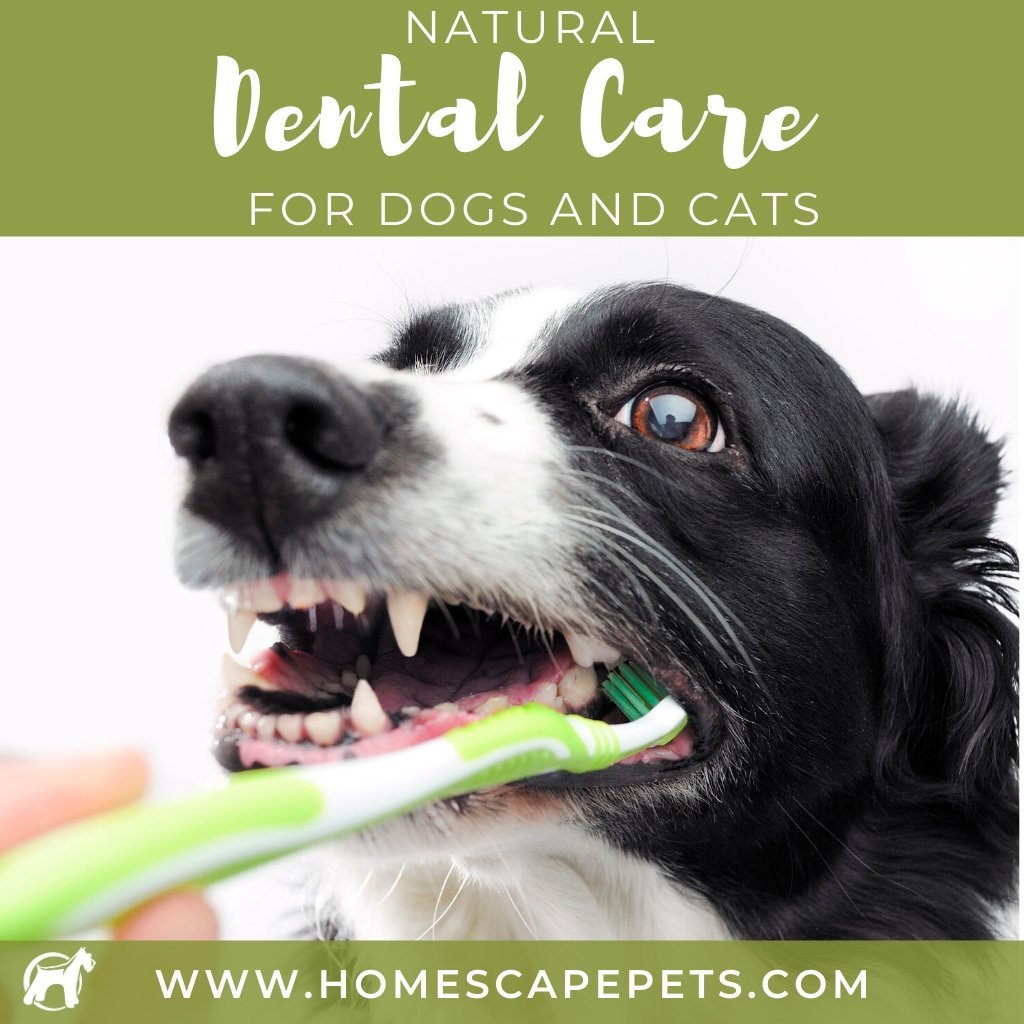
Natural Dental Care for Dogs and Cats
Share

For many people, dental care is an uncomfortable topic. There tends to be a lot of shame associated with dental hygiene, guilt over negligence, or just plain stress around having to visit the dentist. But February just happens to be National Pet Dental Health Month, which is as good a time as any to get down to the nitty-gritty of your pet’s dental hygiene.
The lifestyles of wild carnivorous animals are such that teeth are kept naturally healthy and strong, but the diets of domestic pets are an entirely different matter. Your pets are likely not hunting and killing their own prey, after all! It’s up to you to maintain the cleanliness of their gums and teeth, which, let’s admit...is difficult.
However, maintaining your cat or dog’s dental health doesn’t just ensure good breath and prevent periodontal disease. Many serious health issues like kidney, liver, and heart diseases stem from poor dental hygiene in pets. In fact, most veterinarians find that once dental health issues are resolved in pets, they exhibit fewer behavioral problems as well. I mean, we’re irritable, too, when we experience chronic dental pain, right?
Addressing your own dental care is hard enough. It’s no surprise, then, that many pet parents don’t brush their cat or dog’s teeth, much less take them to the vet for routine dental cleanings. But if you’re like Homescape Pets, thinking about natural dental care might help put your mind at ease. Taking care of your pet’s oral hygiene doesn’t have to be so intimidating!
We’re here today to talk about natural dental hygiene in pets, and to leave you equipped to handle your pet’s oral hygiene with extra care and less stress. And, as always, please consult your veterinarian before introducing anything new to your dog or cat’s diet!
Bones: Not Just Fido’s Treat
Let’s go back to how animals naturally keep their teeth clean in the wild: being carnivorous, dogs and cats rely on flesh and bone for their dental care. Cats eat their entire prey—even bones. And dogs, whether domestic or not, just love chewing on a good hardy bone. In other words, bones are like nature’s toothbrushes!
However, keep in mind the number one rule when it comes to pets and bones: never give your cat or dog cooked bones. They tend to splinter off and can choke your pet or cause esophagus injury, presenting problems far more serious than bad breath. Look for raw bones only: for dogs, you’ll want to invest in the right bones, making sure that they aren’t small enough to swallow. Raw beef bones are great, especially femur and knucklebones. And keep an eye on your pup while he chews and switch out his bone for a new one when it gets too small.
For dental hygiene in cats, your commercial kibble isn’t enough. Try asking your grocery store butcher for chicken or turkey necks, which your kitty will love nibbling while also getting the dental benefits she needs. In fact, we frequently have these in stock as part of our Treat & Chews collection.
The Pros of Probiotics
It might surprise you, but your pets consume trillions of bacteria every day. Some go on down to the gastrointestinal tract for excretion and others stay in your cat or dog’s mouth and will colonize the plaque that lives there. Too much bad bacteria will lead to dysbiosis, a microbial imbalance that can lead to a number of other health conditions. In layman’s terms, your pets need good bacteria to maintain overall stasis in their health.
Even if you’re brushing your cat’s or dog’s teeth regularly, bacterial colonies grow back almost immediately, and harmful bacteria can overgrow and act fast. However, probiotics (a good kind of bacteria) can help battle these colonies, preventing and even treating dental disease. Try introducing more probiotics into your pet’s diets, like kefir or fermented vegetables… an all-natural way to keep a clean mouth!
Simple Diet Changes for Simple Solutions
There are a number of other ways you can boost your dog or cat’s diet to promote healthy teeth and gums: enzymes, antioxidants, and Omega-3 fatty acids all support periodontal health. For instance, Omega-3 fatty acids contain anti-inflammatory components that encourage strong teeth and bones, aid in digestion and promote healing. Talk to your veterinarian to see how you can introduce more Omega-3 fatty acids to your pet’s food bowl!
Raw diets are becoming increasingly popular in holistic circles, but we know that switching to a completely raw diet can be challenging. Still, some raw foods are antioxidant-rich and can protect your pet’s body from oxidative harm. Throwing in a few pet-friendly fruits and veggies will go a long way in his or her overall health, and, surprisingly, support their dental health, too!
Raw foods will also provide much-needed enzymes to your cat or dog’s diet. Since enzymes help his or her absorption of nutrients, regulate inflammation, and add digestive support, they’re great in supporting good dental hygiene. Fruits, especially, hold natural enzymes like bromelain and papain to serve these necessary functions in your pet’s digestion.
All-Natural Dental Chews
Easy for the pet parent and delicious for the pet, dental chews are often the go-to solution for keeping up with your pet’s dental hygiene. It’s important to remember, however, that dental chews are in no way a replacement for teeth-brushing or routine visits to the vet. Also, many of the most popular dental chews have very unhealthy ingredients! Make sure you read the label. If it has ingredients you can't pronounce, keep looking. There are many ways to keep your pet’s mouth clean, and dental chews should only be used to support an overall good dental regimen.
Looking for the right dental chew should be treated the same as you would treat your cat’s or dog’s food. Of course, we at Homescape Pets are partial to limited-ingredient, all-natural foods and the same goes for treats! Hard natural chews are great to keep up the chewing action that not only reduces plaque but reduces bad breath in our pets. Our Simply Natural Chews, single-ingredient, all-meat chews are perfect for scraping tartar and plaque, keeping gums healthy, and pets happy.
However, we strongly recommend routine visits to your trusted veterinarian to address your pet’s dental health if there are already problems with bad breath and visible tooth decay. We know it’s not easy, but trust us—waiting will only make it worse! If your pet already suffers from dental disease or associated aches and pains, our Calming Relief Hemp & Turmeric Oil for Pets can help calm his or her discomfort, while Restful Pet Hemp Oil, Chamomile, and Valerian for Pets and can help reduce the stress of a dental exam at the vet!
Stay tuned for our new chews and treats section to add even more flavor to your pet’s healthy and happy lifestyle!
